 Whenever Presbyterians approach our food and farm policies, we can hang our hats on our faith conviction “that God our Creator has made the world for everyone, and desires that all shall have daily bread” (UPCUSA, Minutes, 1979, p. 189). This underlying conviction of a right to food shapes our advocacy about agriculture and the food system.
Whenever Presbyterians approach our food and farm policies, we can hang our hats on our faith conviction “that God our Creator has made the world for everyone, and desires that all shall have daily bread” (UPCUSA, Minutes, 1979, p. 189). This underlying conviction of a right to food shapes our advocacy about agriculture and the food system.
With this value in mind, you can weigh in on the Farm Bill debates that are heating up in our nation’s capital ~ Write to your Senators about the Farm Bill today! This link takes you straight to the PCUSA which allows you to reach your Senators in less than a minute. Seriously. Time yourself.
“Why would I do that? you ask . . .
Well, our nation’s food and farm policies, as embodied in the U.S. Farm Bill, impact people and communities from rural America, to urban centers, to developing countries – hundreds of millions of people! In the current budget climate, the Farm Bill’s limited resources must be targeted effectively where the need is greatest. We must prioritize programs and policies that curb hunger and malnutrition, support vibrant agricultural economies in rural communities, and promote the sustainable use of natural resources.
The PC(USA) Office of Public Witness has joined with the interfaith community to call for a Farm Bill that promotes local food security in the U.S. and around the world, strengthen rural communities, and care for the land as God’s creation.
The Senate is currently debating the reauthorization of the Farm Bill – the Agriculture Reform, Food and Jobs Act of 2012 – and consideration promises to drag out for over a week, as hundreds of amendments will be offered. Your Senators need to hear from you about a just and healthy Farm Bill.
The letter will do this automatically, but let’s lay out the important issues. What we want is a Farm Bill that:
- Restores cuts to the SNAP program, while reforming crop insurance subsidies. Senator Gillibrand has introduced an amendment to this effect.
- Fully funds conservation programs, such as the Conservation Stewardship Program, and preserves the conservation compact, making sure that enrollment in any new insurance subsidies are tied directly to compliance with conservation programs.
- Includes full mandatory funding for Socially Disadvantaged Farmers through the 2501 title. Senator Udall has introduced an amendment to this end.
- Includes all elements of the Local Farms, Food, and Jobs Act (S. 1773) introduced by Senator Brown.
- Includes the Packer Ban to limit consolidation in the meat industry, in accordance with the amendment introduced by Senator Grassley.
- Robustly funds the Rural Development title, which is essential for spurring rural economic activity and creating jobs.
- Shifts our food and farm policy away from price supports that advantage the large, industrial farms, and instead levels the playing field for small and medium-sized growers, as well as a new generation of farmers.
Right?!
U.S. food and agricultural policy must focus on adopting best agricultural practices that put the health of its citizens, the land and the livelihood of farmers and farm workers over the interests of a small number of large, industrial agriculture operations. Stand up to protect not only farmers, without whom we would all go hungry, but to enact a food and farm bill that fairly and judiciously serves the interests of all Americans.
In a 1985 statement, the Presbyterian Church (USA) General Assembly wrote “we believe it is the responsibility and duty of the Federal government to enact a comprehensive, long-term food and fiber policy, with specific price, production and conservation goals designed to protect and enhance family-farm agriculture in the United States … We believe further that this nation must establish a strong system of sustainable agriculture and prevent the continuing concentration of land in the hands of a smaller and smaller number of owners” (Minutes, 1985, p. 399).
You’re still reading? Click here and register your beliefs with your civil servants sitting in Congress.
Now!
Read more »
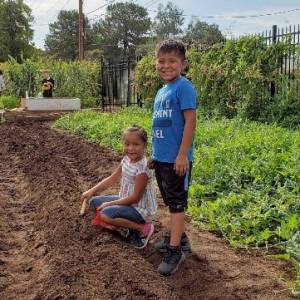 One hundred! That’s how many Hunger Action Congregations we are celebrating on World Food Day, October 16, 2022. Congregations around the nation are serving thousands of meals for people in their communities each week; growing food in community gardens and often donating from the abundance; offering shelter for many through their ministries with people experiencing… Read more »
One hundred! That’s how many Hunger Action Congregations we are celebrating on World Food Day, October 16, 2022. Congregations around the nation are serving thousands of meals for people in their communities each week; growing food in community gardens and often donating from the abundance; offering shelter for many through their ministries with people experiencing… Read more »
 One hundred! That’s how many Hunger Action Congregations we are celebrating on World Food Day, October 16, 2022. Congregations around the nation are serving thousands of meals for people in their communities each week; growing food in community gardens and often donating from the abundance; offering shelter for many through their ministries with people experiencing… Read more »
One hundred! That’s how many Hunger Action Congregations we are celebrating on World Food Day, October 16, 2022. Congregations around the nation are serving thousands of meals for people in their communities each week; growing food in community gardens and often donating from the abundance; offering shelter for many through their ministries with people experiencing… Read more »
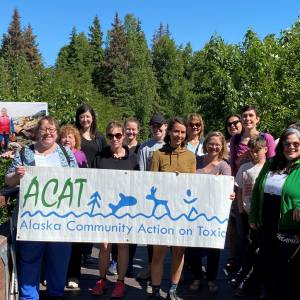 This update comes from Alaska Community Action on Toxics, a Presbyterian Hunger Program grant partner. The goal of the Yarducopia organic gardening program is to build a grassroots movement of gardeners in Alaska who will work toward a toxic-free, climate stable, and food secure world. This program continues to grow significantly, with the inclusion of…
This update comes from Alaska Community Action on Toxics, a Presbyterian Hunger Program grant partner. The goal of the Yarducopia organic gardening program is to build a grassroots movement of gardeners in Alaska who will work toward a toxic-free, climate stable, and food secure world. This program continues to grow significantly, with the inclusion of…  This reflection comes to us from AJ Bisesi, Community Engagement Coordinator for Garfield Community Farm, a ministry of The Open Door Presbyterian Church. Getting produce to our neighbors is an integral tenet of our organization’s mission. We distribute produce in multiple ways, including donating. Valley View Presbyterian Church, one of our church partners from the…
This reflection comes to us from AJ Bisesi, Community Engagement Coordinator for Garfield Community Farm, a ministry of The Open Door Presbyterian Church. Getting produce to our neighbors is an integral tenet of our organization’s mission. We distribute produce in multiple ways, including donating. Valley View Presbyterian Church, one of our church partners from the… 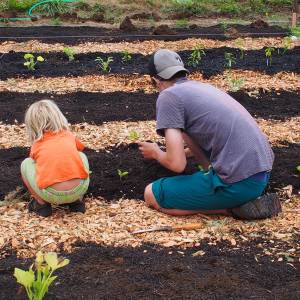 This reflection comes from Bruce Kelsh, Chair of Earth and Social Justice Committee for First Presbyterian Church, in Cottage Grove, OR. Fifty percent of the people in our rural community are classified as being in poverty or ALICE (Asset Limited Income Constrained), that is, the working poor. There is a shortage of fresh produce for…
This reflection comes from Bruce Kelsh, Chair of Earth and Social Justice Committee for First Presbyterian Church, in Cottage Grove, OR. Fifty percent of the people in our rural community are classified as being in poverty or ALICE (Asset Limited Income Constrained), that is, the working poor. There is a shortage of fresh produce for… 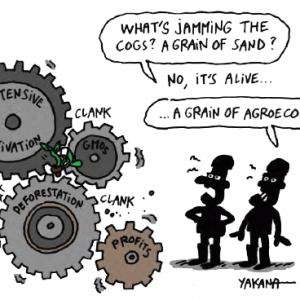 The description on the United Nations website sounds wonderful! In 2021, UN Secretary-General António Guterres will convene a Food Systems Summit as part of the Decade of Action to achieve the Sustainable Development Goals (SDGs) by 2030. The Summit will launch bold new actions to deliver progress on all 17 SDGs, each of which relies…
The description on the United Nations website sounds wonderful! In 2021, UN Secretary-General António Guterres will convene a Food Systems Summit as part of the Decade of Action to achieve the Sustainable Development Goals (SDGs) by 2030. The Summit will launch bold new actions to deliver progress on all 17 SDGs, each of which relies… 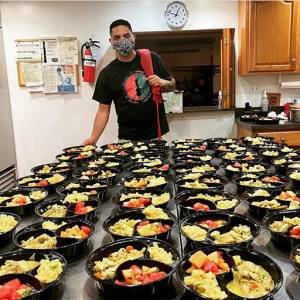 This reflection comes from Brenda Becerra, Senior Development Associate for Little Village Environmental Justice Organization (LVEJO), a Presbyterian Hunger Program grant partner. Our world turned upside down in what seems like one day to another when the pandemic hit and we had to accept this new reality and try to adapt fast. We had no…
This reflection comes from Brenda Becerra, Senior Development Associate for Little Village Environmental Justice Organization (LVEJO), a Presbyterian Hunger Program grant partner. Our world turned upside down in what seems like one day to another when the pandemic hit and we had to accept this new reality and try to adapt fast. We had no…  10 Ways to Faithfully Respond With gratitude to Ryan Cumming (ELCA) from whom I borrowed liberally; but any mistakes are mine. ~ Andrew Kang Bartlett This is completely new territory for many of us. As we respond to help slow the spread of COVID-19, the routine daily movements of individuals, faith communities, businesses, and more…
10 Ways to Faithfully Respond With gratitude to Ryan Cumming (ELCA) from whom I borrowed liberally; but any mistakes are mine. ~ Andrew Kang Bartlett This is completely new territory for many of us. As we respond to help slow the spread of COVID-19, the routine daily movements of individuals, faith communities, businesses, and more…  Today we’re featuring a beautiful report-back on a national interfaith gathering that the Presbyterian Hunger Program helped plan and facilitate last month at Paicines Ranch in California. The goal of the convening was to figure out ways to make more faith-owned lands available for sustainable food production to new farmers eager to work the land. …
Today we’re featuring a beautiful report-back on a national interfaith gathering that the Presbyterian Hunger Program helped plan and facilitate last month at Paicines Ranch in California. The goal of the convening was to figure out ways to make more faith-owned lands available for sustainable food production to new farmers eager to work the land. … 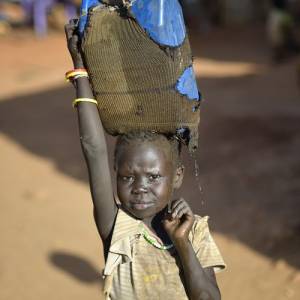 Following years of war coupled with extreme drought, South Sudan is experiencing major disruptions in food production and supply resulting in extreme food shortages and malnutrition. In emergency disaster situations such as famine, we partner with the Presbyterian Disaster Assistance (PDA) and ACT Alliance to help address the current immediate need. In South Sudan, PDA is also working with Presbyterian…
Following years of war coupled with extreme drought, South Sudan is experiencing major disruptions in food production and supply resulting in extreme food shortages and malnutrition. In emergency disaster situations such as famine, we partner with the Presbyterian Disaster Assistance (PDA) and ACT Alliance to help address the current immediate need. In South Sudan, PDA is also working with Presbyterian…  Whenever Presbyterians approach our food and farm policies, we can hang our hats on our faith conviction “that God our Creator has made the world for everyone, and desires that all shall have daily bread” (UPCUSA, Minutes, 1979, p. 189). This underlying conviction of a right to food shapes our advocacy about agriculture and the food system.
Whenever Presbyterians approach our food and farm policies, we can hang our hats on our faith conviction “that God our Creator has made the world for everyone, and desires that all shall have daily bread” (UPCUSA, Minutes, 1979, p. 189). This underlying conviction of a right to food shapes our advocacy about agriculture and the food system.